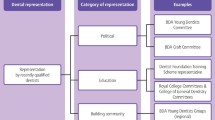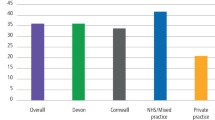Key Points
-
Outlines the roles and responsibilities of a dental trainee representative.
-
Inspires junior dentists to consider applying for these roles to develop their leadership and management skills.
-
Showcases the attributes that can be gained in these positions.
Abstract
Dental trainees have an important role to play in quality assuring training programmes. Local education and training boards (LETBs) actively encourage trainee engagement through structured feedback, which acts as a valuable source of critical appraisal. This is designed to support the structure of training programmes and influences its quality and content. In 2014, East Midlands LETB appointed a regional trainee representative to collate, present and promote dental foundation and core trainee issues to the Dental School Board, as well as highlight their accomplishments and achievements. The pilot brief given was to evolve the post to better support trainees and quality manage the various feedback pathways. This allowed for further research into the existing trainee representative posts across the East Midlands, and highlighted the specific and unique benefits of having regional trainee representation to be the overarching voice on the LETB. This article sets out the framework of responsibilities of a regional trainee representative, contrasts it with established representative posts (regionally and nationally), and advocates why dental schools should appoint to these positions to promote the voices of their trainees. It will also explain the advantages of being a representative, as well as highlight some of the challenges, in the hope that it encourages the next generation to consider applying for these roles.
Similar content being viewed by others
Background
I graduated from dental school in 2014 and started my journey as a newly qualified foundation trainee. The first few months were daunting; the clinical exposure to high dental need patients, combined with demanding patient expectation started to take their toll. Coupled with the frequent thoughts of 'will this patient sue me?', I turned to my educational supervisors for additional support. Their encouragement and vast dental experiences helped me to put unfamiliar situations into perspective, complete my training post as my 'best self' and most importantly, love my job. The enjoyment of dentistry was now underpinned by a strengthened resilience, clinical confidence and reflective learning style. Hindsight has allowed me to appreciate the importance my trainers have had in shaping, mentoring and moulding me into an ethical dental professional. My experience of undertaking foundation training in the East Midlands resulted in my trainers being recognised with the programmes, 'Trainers of the year' award, and motivated me to become involved in the educational aspect of the posts for future foundation dentists. After successfully competing for, and securing a core training programme within the East Midlands, I was offered the role of regional trainee representative.
Questions
What is a regional trainee representative?
The definition of a regional trainee representative has been exclusively developed by Health Education England. It is understood to be a person who works within the region in which they train and actively represents the overarching voice of the dental foundation and core trainees. Within the East Midlands, there are 11 local trainee representatives who are situated respectively within their foundation schemes or in secondary care trusts. They obtain feedback directly from their groups, collate this into a report and submit this to the regional representative. A final document is then produced by the regional representative, reviewed by the trainees, and presented at the school board meetings. Within weeks of that meeting, a formal response is made to the trainees, acknowledging the points they have raised and any immediate action taken.
Specifically the roles and responsibilities of a regional trainee representative include:
-
1
The provision of a consistent and, when necessary, confidential channel of communication, between the dental trainees and the LETB
-
2
The formulation of a feedback report that explores all aspects of a training post in order to safeguard the trainees' experiences. This includes building in an easily understood escalation policy, particularly when patient or trainee safety issues are highlighted, as well as raising concerns or highlighting successes over the quality of local training
-
3
The provision of training and guidance for local scheme representatives to create qualitative, professional and timely feedback for the regional trainee representative. This is investigated and disseminated to the trainees before a summary report is presented to the school board
-
4
Offering trainees input into key strategic and management issues relating to the dental school's educational governance
-
5
Working closely with the dental school to identify, develop and implement innovation in education
-
6
Helping trainees reach their potential by providing a mentoring role and another layer of support, which can range from careers advice and job application assistance, to signposting them to the most suitable individual within the dental school
-
7
The provision of an additional forum of communication, updates and dissemination of information between the trainees and the dental school. Scheme representatives can also contribute to this virtual platform.
How does my role differentiate from other regions?
Nationally, LETBs support dental training programmes with trainee representation. East Midlands have promoted the role of the regional trainee representative beyond the national framework, by allowing me to advocate the voice of the trainee and act on their behalf as an elected member of the dental school board. My opinions hold equal value to other members of the board and I am actively encouraged to engage, listen and evaluate how to shape the quality of training. I also work exclusively with the East Midlands quality team, who support the governance frameworks across healthcare. For example, within the past year, the team have collaborated with me to develop and implement a secure feedback pathway. It ensures, where necessary, responses remain confidential, timely and appropriate, yet within a user-friendly format.
How does a regional post compare to existing models?
Using available data from direct contact with the dental deaneries, plus online resources, I have collated and summarised the model of trainee representation currently adopted across the UK.
The results illustrated in Figure 1 show that all LETBs actively engage with their trainees, demonstrating the value that feedback holds in developing and quality assuring training programmes. Although the figures do not reflect the overall number of representatives employed within each deanery, it depicts the type of representative who falls within regional models nationally. Foundation and specialty training have strong representation, but the models vary as 'trainee forums' and specialist training committees appear to be the main feedback route into the dental schools. In these cases, there does not appear to be a regional representative model that acts as a single point of contact between the schools and trainee body.
Why become a trainee representative?
As dental speciality training becomes more aligned with the medical training pathway, there is an expectation to develop and demonstrate leadership and management skills early on in our career. It is not always easy to obtain these opportunities outside of clinical practice, therefore standing as a trainee representative, whether local or regional, will help to develop and strengthen these characteristics.
There is a misconception that people only become trainee representatives to enhance their CVs. I have noted that trainees appointed as the local representatives demonstrate a genuine motivation to reflect on their training and put forward suggestions to improve current training and working conditions. The success of their feedback is often a reflection of the engaged individuals, who demonstrate natural leadership, instil trust within their colleagues, are organised and have a professional approach. In addition, securing genuine applicants for this role is quality assured through a robust application process in which the trainees must demonstrate their suitability. Successful applicants are selected by a panel of training programme directors (TPDs) and the associate postgraduate dean, underlying the significance attached to the role.
The role of regional trainee representative is offered to a dental trainee who works within the East Midlands, usually at dental core training level. They should demonstrate strong situational leadership attributes, including excellent communication and organisational skills to complement the local trainee representatives; as such, they are viewed to be more senior with degree of leadership experience to reflect this expectation.
How is a trainee prepared for these roles?
An advantage of these roles is the offer of additional support and training outside of the clinical work place. Underpinning the value placed on the 'trainee voice', the dental school provides appropriate training in collecting feedback, questionnaire design, report writing and presentation skills. The regional trainee representative is also provided with high-level support from the postgraduate dental dean, regular feedback on performance and a letter of commendation for the training portfolio. I would reassure any prospective applicants not to be concerned with the demands of the role, as full induction and training are provided.
What are the challenges of being a trainee representative?
Undertaking a role where you are expected to represent your peers presents its own unique challenges. Representatives need to develop an approachable and non-judgemental persona throughout their tenure; this can sometimes sit uncomfortably with trainees who value 'fitting in' with their peers more than setting an example of good professionalism. The transition from undergraduate student to dental professional can feel significant, so the added responsibility of becoming a peer representative may feel like an additional pressure they would rather avoid.
In any role where you are responsible for collating and distributing feedback, excellent communication skills are key. One of the regular challenges representatives face is attaining quality and measured feedback from engaged trainees. Often, schemes require regular reminders as to why their voices are necessary in quality assuring the training programmes.
Encountering issues of conflict or concern from peers and senior colleagues can sometimes fall beyond a representative's scope of practice. Having insight into these limitations is essential to enable appropriate and timely escalation. Not knowing the answer is not a failure, and those who quickly identify this whilst seeking the most appropriate avenues for advice, often transition into excellent representatives. Within the East Midlands, there is a clear and well-defined pathway to raise concerns, and to help guide and support the representatives throughout their posts.
Am I suited to this role?
The role of a trainee representative, whether local or regional, provides a good opportunity to communicate and work collaboratively with peers, and senior colleagues, on a wide range of projects across the dental school. In circumstances of success and conflict, or potentially difficult conversations, this position exposes you to express your views in a diplomatic and professional manner. The wide range of experiences that being a trainee representative affords not only shapes you into a better dentist, by understanding the wider strategic aspects of healthcare politics, but helps to mould you into a future leader of the profession.
The position of trainee representative may not suit everyone, but for the right person the breadth of experience gained far exceeds the challenges outlined. If you are enthusiastic, have excellent organisation skills, a natural leadership style, and a tendency to like challenges, I would highly recommend these roles. You have nothing to lose and everything to gain!
Author information
Authors and Affiliations
Corresponding author
Additional information
Refereed Paper
Rights and permissions
About this article
Cite this article
O'Leary, F. What is a regional trainee representative? A personal perspective of a pilot role within the East Midlands. Br Dent J 224, 110–112 (2018). https://doi.org/10.1038/sj.bdj.2017.1040
Accepted:
Published:
Issue Date:
DOI: https://doi.org/10.1038/sj.bdj.2017.1040




